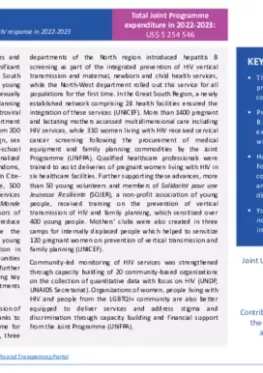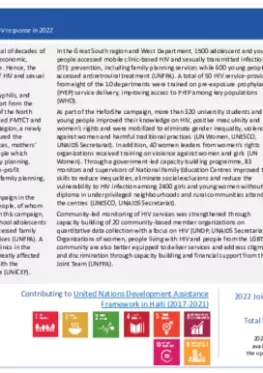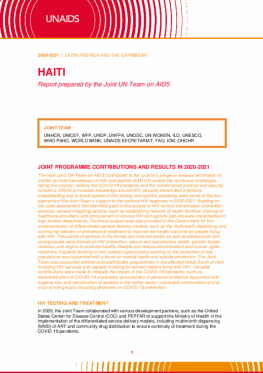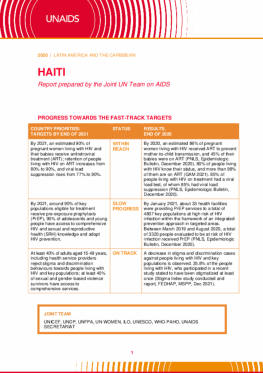Access to services for the prevention of vertical transmission of HIV, syphilis, and hepatitis B considerably improved thanks to technical and financial support from the Joint Programme for scaling up and integration (UNICEF, WHO). For instance, three departments of the North region introduced hepatitis B screening as part of the integrated prevention of HIV vertical transmission and maternal, newborn and child health services, while the North-West department rolled out this service for all populations for the first time. In the Great South Region, a newly established network comprising 28 health facilities ensured the integration of these services (UNICEF). More than 1400 pregnant and lactating mothers accessed multidimensional care including HIV services, while 310 women living with HIV received cervical cancer screening following the procurement of medical equipment and family planning commodities by the Joint Programme (UNFPA). Qualified healthcare professionals were trained to assist deliveries of pregnant women living with HIV in six healthcare facilities. Further supporting these advances, more than 50 young volunteers and members of Solidarité pour une Jeunesse Resiliente (SOJER), a non-profit association of young people, received training on the prevention of vertical transmission of HIV and family planning, which sensitized over 400 young people. Mothers’ clubs were also created in three camps for internally displaced people which helped to sensitize 120 pregnant women on prevention of vertical transmission and family planning (UNICEF).
Community-led monitoring of HIV services was strengthened through capacity building of 20 community-based organizations on the collection of quantitative data with focus on HIV (UNDP, UNAIDS Secretariat). Organizations of women, people living with HIV and people from the LGBTQI+ community are also better equipped to deliver services and address stigma and discrimination through capacity building and financial support from the Joint Programme (UNFPA).
In 2023, Haiti joined the Global Partnership for Action to Eliminate all Forms of HIV-Related Stigma and Discrimination following successful advocacy by the Joint Programme (UNAIDS Secretariat)). A newly established helpline expanded psychosocial support for people from the LGBTQI+ community who experienced stigma and discrimination. The helpline received 500 calls in 2023, and 83 people were referred to psychological services (UNDP).
The Quisqueya University established the first HeforShe club; and hundreds of students improved their knowledge on HIV and positive masculinity, and committed to address unequal gender norms, violence against women and harmful traditional practices through campaigns in university and social media platforms (UN Women, UNESCO, UNAIDS Secretariat). Furthermore, 135 healthcare providers received training on clinical management of gender-based violence cases (UNFPA).
A qualitative study led by the Joint Programme and the Ministry of Labor and Social Affairs generated evidence on the level of sensitivity of current social protection programmes to HIV and the barriers to access existing social protection schemes. These findings will feed into the development of HIV-sensitive social protection programmes, including in response to the socio-economic crisis in Haiti. Finally, a pilot nutrition support initiative, based on counselling and cash transfers, improved nutrition of 1353 people living with HIV and their households and helped to decrease treatment dropout rate from 8% to 1.3% over an eight-month period (WFP).





